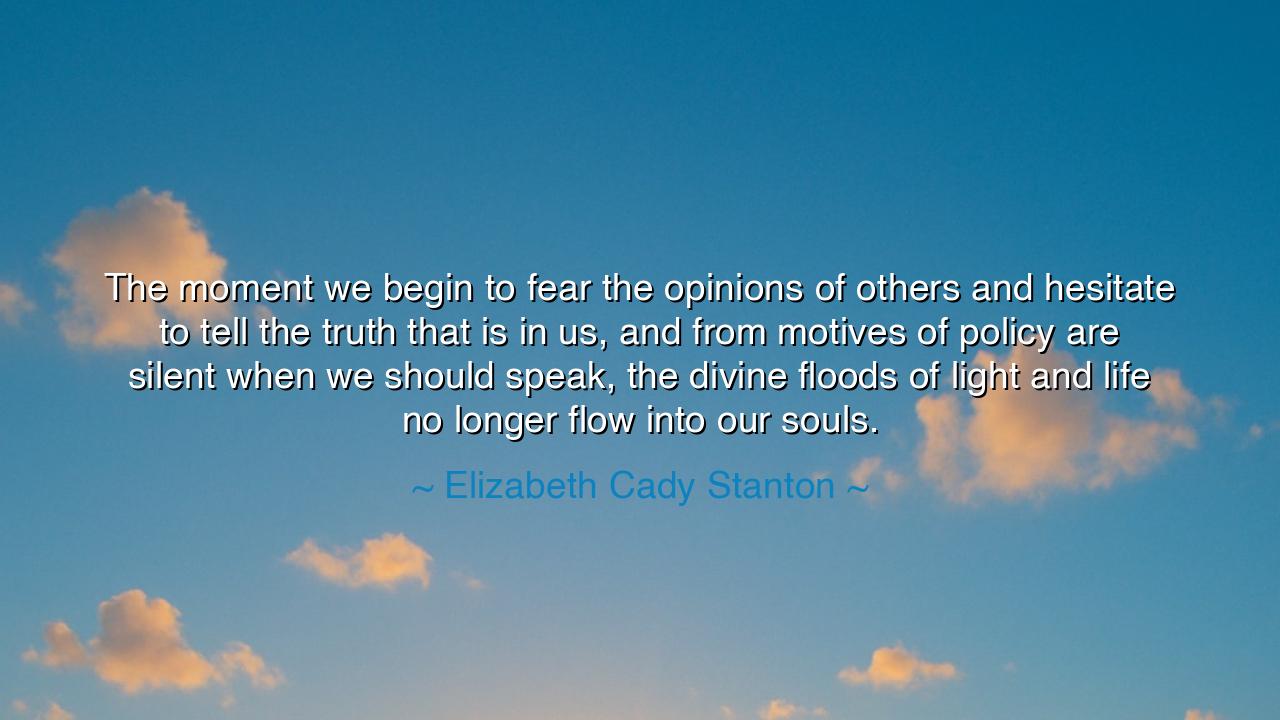
The moment we begin to fear the opinions of others and hesitate
The moment we begin to fear the opinions of others and hesitate to tell the truth that is in us, and from motives of policy are silent when we should speak, the divine floods of light and life no longer flow into our souls.






"The moment we begin to fear the opinions of others and hesitate to tell the truth that is in us, and from motives of policy are silent when we should speak, the divine floods of light and life no longer flow into our souls." – Elizabeth Cady Stanton. These words, spoken by one of the foremost champions of women’s rights and social justice, echo with the profound wisdom of a truth that has always been known by the ancients: when we suppress our truth out of fear—whether it be for acceptance, security, or approval—we not only compromise our integrity, but we also cut ourselves off from the very source of life and inspiration that sustains us.
In the ancient world, those who sought wisdom—whether Socrates, Plato, or Confucius—understood that truth is the most sacred of pursuits. Socrates, in his unwavering commitment to philosophy, dared to speak against the established norms of his society, even when it meant facing death. His belief in the power of truth was so strong that he willingly chose the poison of hemlock over a life of silence. His words rang out through time, reminding us that when we fear to speak our truth, we close ourselves off from the divine light that seeks to flow into our lives. In Socrates’ eyes, truth was not merely an intellectual pursuit, but the very essence of the soul’s vitality.
This wisdom can also be seen in the example of Joan of Arc, who, though just a simple peasant girl, was chosen by divine vision to lead France to victory. She did not fear the opinions of others nor the judgments of those who sought to suppress her voice. She stood firm in her belief, proclaiming the truth as she understood it, even when it led her to the flames. Joan of Arc's bravery teaches us that when we allow fear to silence us, when we suppress our divine calling or the truth that resides within us, we quench the very spirit that gives us life. Her legacy remains as a testament to the power of unshaken conviction in the face of immense adversity.
Stanton’s words, though they speak of an individual’s personal duty to speak truth, also extend beyond the self, calling upon us to recognize that society itself suffers when the truth is not spoken. The suppression of truth—whether for personal comfort or out of fear of repercussions—leads to a society in which deception and falsehood become normalized, and the light of wisdom is dimmed. In the face of oppression, it is those who speak out—who dare to speak against the prevailing powers—that ignite the flame of freedom and justice. History tells us that the most transformative moments often come not from those who remain silent, but from the voices that dare to declare what is true, even in the face of overwhelming opposition.
Consider the story of Mahatma Gandhi once more, whose peaceful resistance against British colonial rule in India was grounded not in fear, but in the unwavering belief in truth and nonviolence. Gandhi's words and actions were not motivated by a desire for popularity or political advantage, but by a deep commitment to the divine force of satya (truth). His courage to speak his truth—no matter the consequences—became the guiding light for millions. Like the flowing rivers that carry life to the fields, his truth nourished and sustained the movement for Indian independence. Gandhi's life shows us that when we speak the truth, we align ourselves with the divine flow of light and life.
Yet, in our own lives, how often do we find ourselves stifled by the fear of judgment, the desire to conform, or the need to preserve our place in society? The fear of being misunderstood or ostracized often causes us to remain silent when we should speak—not only in the face of injustice but in our everyday interactions. The truth of who we are, our needs, and our beliefs, gets buried under the weight of others’ opinions. Elizabeth Cady Stanton’s words remind us that when we silence our truth, we lose the very vitality that fuels our soul. In our reluctance to express ourselves honestly, we draw a veil over the divine light that seeks to flow through us.
Therefore, let us take heed of Stanton's powerful lesson: when we fear the opinions of others and allow that fear to govern our actions, we cut ourselves off from the wellspring of life. Speak your truth, even when it seems inconvenient or difficult, for it is in this act of expression that we reconnect with the divine forces of light and growth. Let us remember the example of the great ones who came before us—the ones who faced persecution, misunderstanding, and suffering, but still chose to speak and act with truth. Let us find courage in the truth of who we are, and in doing so, invite the flood of divine life and light into our souls, for it is in the fullness of our own authenticity that we find our true power and purpose.






AAdministratorAdministrator
Welcome, honored guests. Please leave a comment, we will respond soon